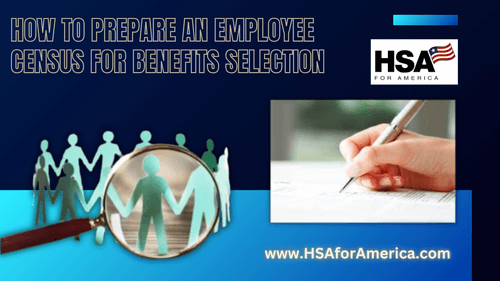What is an Employee Census?

An employee census is a comprehensive report containing specific demographic and employment data about workers within a company, so that a quote on health insurance or other benefits can be calculated.
Here’s what your employee census should include:
Personal Information
- Full Name: first, middle, and last names.
- Date of Birth
- Age
- Sex
- Marital Status
- Number of Dependents
- Each dependent’s Full Name: First, middle, and last names
- Social Security Number (SSN): Full or last four digits of the SSN for each dependent
- Relationship to Employee: Specify the relationship of each dependent to the employee, such as spouse, child (biological, adopted, step-child), domestic partner, etc
- Type of Dependent: Categorize each dependent as spouse, child, domestic partner, etc
- Smoking or tobacco use status
- Race/Ethnicity: Optional, depending on the plan requirements
- Preferred Language: Optional, depending on the plan requirements
Contact Information
- Home Address: Full residential address
- Mailing Address: If different from the home address
- Phone Numbers: Home and cell phone numbers
- Email Address: Personal or work email address
Employment Information
- Employee Identification Number: Unique identifier for each employee
- Social Security Number (SSN): Full or last four digits, depending on privacy policies
- Employment Status: Full-time, part-time, or per diem
- Date of Hire: Original hire date
- Date of Rehire: If applicable, the most recent rehire date
- Termination Date: If applicable, the most recent termination date
- Year-to-Date (YTD) Hours Worked: Total hours worked in the current year
- Union Status: Whether the employee is part of a union or collective bargaining agreement
Additional Information (if required by specific plans)
- Race/Ethnicity: Some plans may require this information
- Preferred Language: Some plans may require this information
This information is essential for insurance providers to assess the risk and determine the premiums for health insurance plans. It also helps in tailoring other benefits to meet the needs of your workforce.
Compare Pricing on the Best Insurance Plans Available
Why is an Employee Census Important?
1. Accurate Insurance Quotes.
Insurance companies require detailed employee information to provide accurate quotes.
The data helps them understand the demographics of your workforce, which influences the cost and type of coverage they can offer.
2. Customized Benefits.
Understanding the makeup of your workforce allows you to select benefits that are most relevant to your employees.
For example, a younger workforce might prioritize different benefits than an older one.
3. Compliance.
Maintaining an up-to-date employee census ensures that your business complies with federal and state regulations regarding employee benefits.
4. Informed Decision-Making.
With detailed employee data, you can make informed decisions about the types of benefits to offer, ensuring they are cost-effective and valuable to your employees.
Steps to Prepare an Employee Census
- Gather Employee Information. Start by collecting the necessary information from your employees. To ensure consistency, you can use a standardized form. The form should include fields for all the data points mentioned earlier.
- Verify the Data. Ensure that the information provided by employees is accurate and up-to-date. This might involve cross-referencing with existing records such as employment contracts, tax forms (W-4, W-2), and identification documents (e.g., driver’s licenses, Social Security cards) or asking employees to confirm their details.
- Conduct Self-Audits. Periodically review the employee census data to identify any missing or inconsistent information. Verify marriage certificates, adoption certificates, birth certificates, and guardianship. Be vigilant to the possibility of employee fraud. For example, some employees may try to claim dependents that aren’t really related to them. Children may age out of your group plan at age or 26 if they are full-time students. Workers may get divorced, but still try to keep their employer-subsidized benefits going or just forget to notify you.
Eligibility Requirements for Employee’sEmployees Dependents
Different types of benefits may have different eligibility criteria. You or your management/HR department should carefully track each employee’s status and match it against the eligibility criteria for each type of benefit.
For example:
Health Plan Eligibility
Dependents are generally eligible to be covered under the employee’s health insurance plan up to age 26, regardless of marital status, student status, tax dependency status, or residence.
401(k) Plan
An employee’s spouse may be eligible to join the company’s 401(k) plan if they work for the company and meet eligibility requirements like service tenure and age.
Other Benefits
Dependents may be eligible for other benefits like dental, vision, life insurance, etc., based on the specific plan details and the type of dependent relationship.
It’s important to note that eligibility rules for dependents can vary based on the type of benefit plan, employer policies, and applicable laws/regulations. Employers should clearly communicate the specific eligibility criteria for each benefit to employees during the census data collection process.
Employees may gain or lose eligibility for benefits by changing jobs/positions, working more or fewer hours, changing from exempt to non-exempt or vice versa, or moving/transferring to another location.
Waiting Periods
401(k) Plan
To be eligible for the 401(k) plan, employees must complete a 12-month waiting period and be at least 21 years old.
Once eligible, they can enroll on the first day of the next calendar quarter (January 1, April 1, July 1, or October 1).
Health Plan
While the compliance guide doesn’t specify a waiting period for health plan eligibility, it emphasizes that benefits must be applied uniformly and without discrimination based on health factors.
Health plans must also provide real-time responses to eligibility inquiries.
Compare Pricing on the Best HealthShare Plans Available
What To Do Now
We understand that assisting your employees in selecting the appropriate health plan and other healthcare benefits can be challenging.
Allow us to handle this task for you. Contact an HSA for America Personal Benefits Manager to receive complimentary, expert assistance in designing and implementing your employee health benefits programs. Or go ahead and fill out our census form so we can prepare you a quote.
For Further Reading: 2024 Complete Guide to Small Business Healthcare Plans | How to Design an Effective Employee Benefits Program | What To Do When Your Employees Can’t Afford Healthcare



